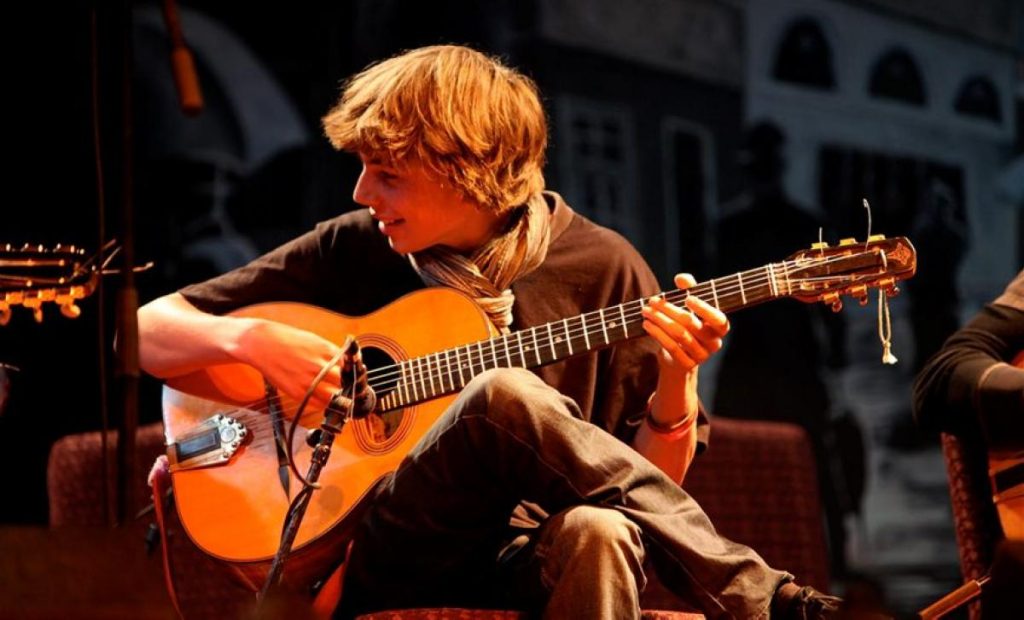Desde muito jovem, Antoine Boyer tem vindo a ser reconhecido pelos seus pares e o facto de ser um músico premiado é sempre surpreendente e digno de ser falado.
Um pouco introvertido, este jovem transborda o seu talento musical tanto para a música clássica como para o Swing cigano. Qual é o teu segredo, Antoine Boyer?
1 - O que é que te inspirou a começar a tocar música? Fala-nos das tuas influências e do que se passava à tua volta nessa altura.
Na minha família, ouvíamos sempre música de Django, Francis-Alfred Moerman, Angelo Debarre, Bratsch, etc. Um dia, o meu pai perguntou-me se eu queria começar a tocar guitarra. Então começámos a aprender juntos... Desde esse momento, tocámos juntos até cerca de 2014.
2 - Quando começaste a aprender guitarra com o teu pai, quem foi o teu mentor, como aprendeste a música?
Aprendemos muito com Mandino Reinhardt e frequentámos um grande número das suas aulas de mestrado. Embora de outras formas, também aprendemos muito com Francis-Alfred Moerman. Gravámos o meu primeiro CD exclusivamente com composições dele.
3 - Começou com música clássica, jazz, ou ambas ao mesmo tempo?
Comecei a usar o estilo manouche aos 6 anos, mas só há cinco anos é que comecei a usar o estilo clássico.
4 - Quais foram os maiores desafios que enfrentou para progredir na sua prática, performance e carreira musical?
Os maiores desafios foram os grandes concertos como o Samois (em 2011) ou o de homenagem a Francis-Alfred Moerman. Outro grande desafio foi o concurso de guitarra clássica deste ano (ganhei!), que me obrigou a trabalhar com muita precisão sobre algumas músicas.
Cada novo projeto ou evento é uma espécie de desafio. Por exemplo, agora estou a trabalhar com o guitarrista flamenco Samuelito. Temos um dueto que mistura guitarras ciganas e flamencas, o que é muito novo e desafiante. E, por exemplo, os concursos de guitarra clássica também são muito desafiantes. Isso obriga-nos realmente a trabalhar com muita precisão em algumas músicas.
5 - Como é que foi ganhar o Concurso de Guitarra Clássica de Montigny?
Muito encorajador !!!
6 - Sobre os concursos de Guitarra Clássica, em que medida é que isso altera os seus hábitos, que influência tem na sua concentração mental e na gestão do stress?
Na verdade, não altera muito os meus hábitos. Apenas tenho de trabalhar um pouco mais todos os dias, uma vez que a data do concurso está a aproximar-se.
7 - Lembras-te do teu processo de prática quando começaste a tocar? Quanto é que mudou ao longo dos anos?
Sinceramente, não me lembro, mas sei que a minha forma de trabalhar mudou muito depois de começar a tocar guitarra clássica. É uma abordagem muito diferente (mas também muito boa) do processo de prática.
8 - Que semelhanças e diferenças encontra no processo de praticar e tocar Jazz e Guitarra Clássica?
O que eu gosto é que tanto o jazz como a música clássica se ajudam mutuamente. O que quero dizer é que um impede-me de me aborrecer com o outro. São linguagens muito diferentes, e é muito interessante aprender com ambas ao mesmo tempo. Na música clássica, por exemplo, não se encontra uma improvisação semelhante à do jazz e, por isso, não posso trabalhar no jazz como trabalho na música clássica.

9 - Fale-nos das suas rotinas. Como é um dia normal na sua vida?
Como tenho de trabalhar tanto na guitarra clássica como na guitarra de jazz, dedico algumas horas por dia a cada disciplina. Normalmente, trabalho durante cerca de uma hora, depois faço uma pausa, retomo outra hora e assim por diante.
10 - Considera-se mais à vontade num concurso ou numa jam session/concerto local?
São coisas completamente diferentes! O concurso tende a ser um pouco mais stressante porque se toca sozinho... No jazz, normalmente toco com outros músicos, por isso é muito diferente.
11 - O que é que valoriza mais nos músicos que gosta de ouvir?
O que mais valorizo, penso eu, é o que podemos sentir quando ouvimos um músico. Sou movido pela sua musicalidade! Mas é difícil dizer... Não há uma regra específica.
12 - Medita, pratica a sua concentração ou aprecia um estado de espírito claro?
Sim... mais ou menos. Tento fazer as coisas de uma forma simples, mas da melhor maneira possível.
13 - Como é que é ter a oportunidade de tocar com alguns dos maiores músicos manouche (Stochelo Rosenberg, Robin Nolan, Adrien Moignard, Paulus Schafer)? Fale-nos dessas experiências.
É muito bom, claro! Cada vez que se tem a oportunidade de estar com estes tipos, recebe-se algo diferente. Isso faz-me aprender muito.
Vou dar-vos um exemplo. Trabalhei com Philip Catherine durante 3 concertos. Tive de trabalhar muito porque o universo musical dele é completamente diferente do que eu conhecia (não é nada manouche), e por isso cresci muito!
E o Stochelo, por exemplo, conheci-o pela primeira vez em Seattle. Ele é um gajo muito, muito simpático!
14 - Lembra-se de algum conselho específico que estes tipos lhe tenham dado?
Recebi muitas dicas ou conselhos pequenos e importantes de muitas pessoas diferentes, e isso ajuda-me a ver e a compreender a música que ouço ou toco.
15 - Por que é que gostaria de ser reconhecido? Qual é o aspeto mais importante do seu percurso de vida que gostaria que as pessoas recordassem?
Normalmente não penso neste aspeto. Simplesmente tento fazer o melhor que posso em diferentes estilos de guitarra. Depois, veremos o que acontece!
16 - O que dirias ao Django se tivesses a oportunidade de o conhecer? Qual seria o disco, o músico, ou a canção que sempre referiu numa conversa sobre Django?
Para conhecer o Django?! Isso seria espetacular... Acho que ficaria quieto sem falar. Seria melhor para mim apenas ouvi-lo! Mas eu referir-me-ia a ele como a muitos músicos muito bons. É difícil saber qual escolher, mas gosto muito de muitos músicos de diferentes géneros: clássico, jazz, flamenco, balcânico, africano, etc.
SEGUIR O NUNO EM:
Loja de livros do sítio Web: https://www.nunomarinho.com/store
Canal de vídeo: https://www.youtube.com/@NunoMarinho
Patreon: https://www.patreon.com/NunoMarinho
Instagram: https://www.instagram.com/nunomarinhoguitar/
Facebook: /https://www.facebook.com/NunoMarinhoGuitar/

